

Consumer Subject Review Boards. September 3, 2013 66 Stan.
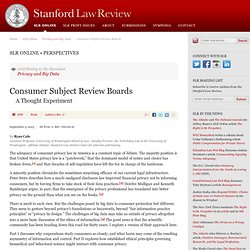
L. Fearless commentary on finance, economics, politics, and power. Organizing a Commonplace Book. A reader of the blog I wrote on Monday commented that Locke’s indexing method isn’t as complicated as I made it appear.
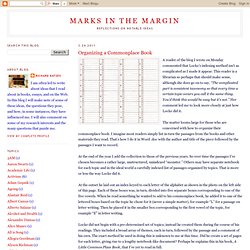
This reader is a librarian so perhaps that should make sense, although she does go on to say, “The complicated part is consistent taxonomy so that every time a certain topic occurs you call it the same thing. You'd think this would be easy but it's not.” Her comment led me to look more closely at just how Locke did it. How And Why To Keep A “Commonplace Book” The other day I was reading a book and I came across a little anecdote.

It was about the great Athenian general Themistocles. Before the battle of Salamis, he was locked in a vigorous debate with a Spartan general about potential strategies for defeating the Persians. Themistocles was clearly in the minority with his views (but which ultimately turned out to be right and saved Western Civilization). He continued to interrupt and contradict the other generals. Finally, the Spartan general threatened to strike Themistocles if he didn’t shut up and stop.
Electoral10-1100.jpg (JPEG Image, 1100 × 848 pixels) Topos. Grothendieck topoi (topoi in geometry)[edit] Equivalent definitions[edit]
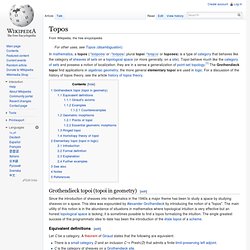
Noncommutative geometry. Motivation[edit] Functions on a topological space can be multiplied and added pointwise hence they form a commutative algebra; in fact these operations are local in the topology of the base space, hence the functions form a sheaf of commutative rings over the base space.
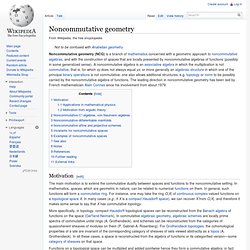
The dream of noncommutative geometry is to generalize this duality to the duality between noncommutative algebras, or sheaves of noncommutative algebras, or sheaf-like noncommutative algebraic or operator-algebraic structuresand geometric entities of certain kind, and interact between the algebraic and geometric description of those via this duality. Applications in mathematical physics[edit] Some applications in particle physics are described on the entries Noncommutative standard model and Noncommutative quantum field theory. Motivation from ergodic theory[edit] Some of the theory developed by Alain Connes to handle noncommutative geometry at a technical level has roots in older attempts, in particular in ergodic theory. Zermelo–Fraenkel set theory. In mathematics, Zermelo–Fraenkel set theory with the axiom of choice, named after mathematicians Ernst Zermelo and Abraham Fraenkel and commonly abbreviated ZFC, is one of several axiomatic systems that were proposed in the early twentieth century to formulate a theory of sets free of paradoxes such as Russell's paradox.
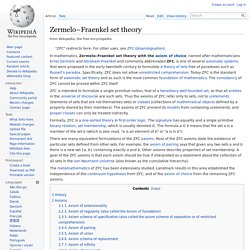
Specifically, ZFC does not allow unrestricted comprehension. Russell's paradox. Naive set theory. Twistor space. Roger Penrose. Sir Roger Penrose OM FRS (born 8 August 1931), is an English mathematical physicist, mathematician and philosopher of science.
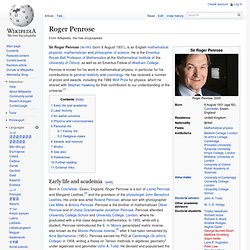
He is the Emeritus Rouse Ball Professor of Mathematics at the Mathematical Institute of the University of Oxford, as well as an Emeritus Fellow of Wadham College. Penrose is known for his work in mathematical physics, in particular for his contributions to general relativity and cosmology. He has received a number of prizes and awards, including the 1988 Wolf Prize for physics, which he shared with Stephen Hawking for their contribution to our understanding of the universe.[1] Early life and academia[edit] Weird fiction. H.
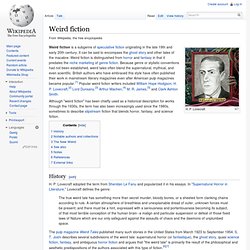
P. Lovecraft Weird fiction is a subgenre of speculative fiction originating in the late 19th and early 20th century. : RevolutionSF - Epic Pooh : Feature. Author's Note: 'Epic Pooh' was originally published as an essay by the BSFA, revised for its inclusion in the 1989 book Wizardry and Wild Romance, A Study of Epic Fantasy, and slightly revised again for this publication.

It was written long before the publication and much-deserved success of Philip Pullman's 'His Dark Materials' trilogy which, in my view, merits all the optimism I have expressed here. The essay did not attempt to deal with all fantasy, such as Alice in Wonderland or other children's fantasy, but only epic fantasy from its origins in romance poetry to the present day. Kenneth Anderson (writer) British writer and hunter Kenneth Douglas Stewart Anderson (8 March 1910 – 30 August 1974) was an Indian-born, British writer and hunter who wrote books about his adventures in the jungles of South India.
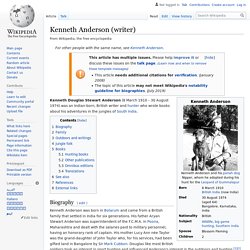
His love for the inhabitants of the Indian jungle led him to big game hunting and to writing real-life adventure stories. MrCreepyPasta. Mayo v. Prometheus: Natural Process + Known Elements = Normally No Patent. By Dennis Crouch Mayo Collaborative Services v. Prometheus Labs., Inc. (Supreme Court 2012) A unanimous (9–0) Supreme Court has held that the personalized medicine dosing process invented by Prometheus is not eligible for patent protection because the process is effectively an unpatentable law of nature. This decision reverses the Court of Appeals for the Federal Circuit’s holding that the claims were patentable because they included substantial physical limitations. Bending Light. 2012 March 12 - The Scale of the Universe Interactive.
Discover the cosmos! Each day a different image or photograph of our fascinating universe is featured, along with a brief explanation written by a professional astronomer. 2012 March 12 The Scale of the Universe - Interactive Flash Animation Credit & Copyright: Cary & Michael Huang. The 10 Most Puzzling Ancient Artifacts. Untitled. George Edwards and the Powerless Presidential Bully Pulpit. Richard Neustadt, who died in 2003, was the most influential scholar of the American Presidency. He was a founder of Harvard’s Kennedy School of Government and an adviser to Harry Truman, John F. Kennedy, Lyndon Johnson, and Bill Clinton, and, in his book “Presidential Power” (1960), he wrote the most frequently quoted line in Presidential studies: “The power of the presidency is the power to persuade.” On August 31st of last year, President Barack Obama prepared to exercise that power.
Frustrated with the slow recovery of the economy, he wanted to throw the weight of his office behind a major new stimulus package, the American Jobs Act. To this end, the White House announced that the President would deliver a televised speech to a joint session of Congress, and, as is customary, the President sent a letter to the Speaker of the House, John Boehner, asking him to schedule the address for September 7th. Like many political scientists, Edwards is an empiricist. George W. Creative.